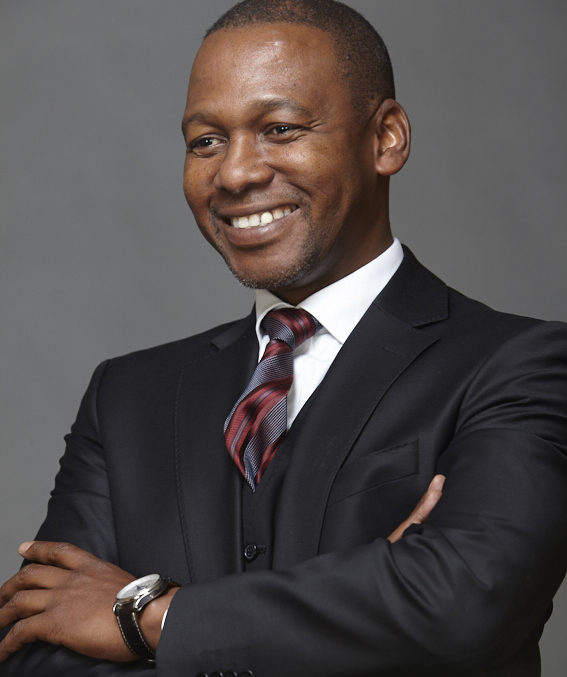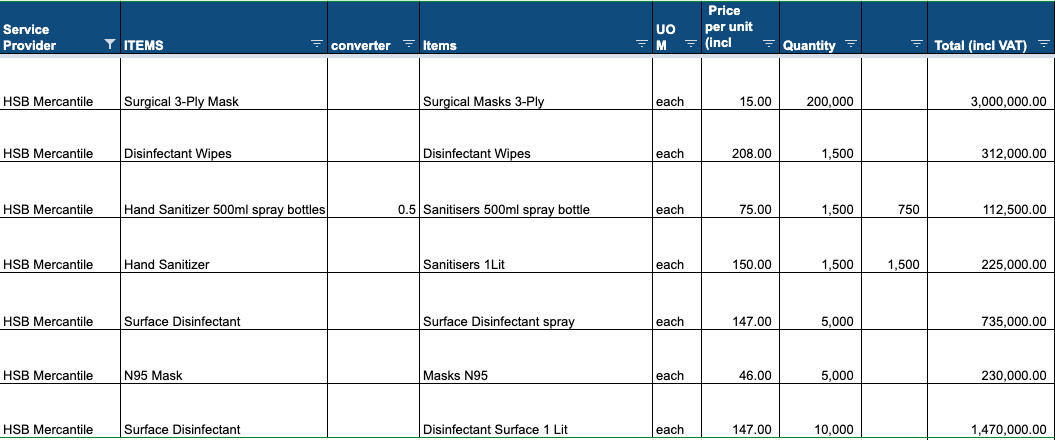How did an emergency health procurement budget of about R50-billion become a cadres’ feast?
Here’s one story that illustrates the trend. Harvey Sicelo Buthelezi is the perfect example of a connected cadre. His CV is dotted with jobs in government and executive jobs outside of government, but which need political connectivity.

Harvey Sicelo Buthelezi. (Photo: genrec.co.za)
According to his LinkedIn profile, in July 2020, he listed as his key role the job of executive chairman of a company called HSB (his initials) Mercantile. That company won Covid-19 contracts worth millions of rand between March and July – and it is one of 90 contracts being probed for malfeasance by the Special Investigating Unit (SIU).
The Sunday Times reported that Buthelezi received contracts worth R873-million, but the Daily Maverick list below suggests a smaller quantum and shows the range of goods he supplied to the government.

Buthelezi is also CEO of the HSB Advisory Group which lists its interests as civil infrastructure, property, minerals and energy; before that, Buthelezi was Group COO of the Southern Palace Group of companies, none of which were in the health sector.
In 2018, Buthelezi was appointed MD of Genrec Engineering which bought out some of the Murray & Roberts portfolio. In that role, he listed his specialities as mining, rail stock, energy and construction – not health. Buthelezi’s story reveals how many politically connected cadres lining up to provide essential goods profiteered from Covid-19, even though many had no experience or history in health goods provision. A recording company, as well as several events companies, got into the game, the lists of contracts show.
How did Buthelezi and others do it?
“You have people there who continue to manipulate the system,” says a senior Gauteng government official, who spoke on condition of anonymity.
Gauteng premier David Makhura asked the SIU to investigate after whistle-blowers alerted him to cadre enrichment. The presidential spokesperson, Khusela Diko, has taken leave after it emerged that her husband, amaBhaca leader Thandisizwe Diko, almost bagged contracts worth R47-million (or more, according to the Sunday Times).
Buthelezi, for example, would have had connections across the Gauteng government spectrum – Covid-19 funds are allocated from the National Treasury to the provinces – to buy the products needed.
The 90 contracts are for the goods of life, like masks, sanitisers, disinfectants, hazardous goods disposal, gowns, shoe covers and the like. Buthelezi’s CV shows that he had worked in the Gauteng Health Department several times before, so obviously he maintained connections among the civil servants who dished out the deals.
System failure is also clear in the fact that Buthelezi was a senior leader in the department in two of the darkest periods in its history.
Between 2006 and 2010, more than R1-billion was stolen from the Gauteng Department of Health when, according to Buthelezi’s resumé, he appears to have been part of the department’s leadership corps.
He was an adviser in the department between March 2015 and February 2017, which was exactly when the Life Esidimeni tragedy played out. That story was also a cadre scandal, as the mentally impaired people who were farmed out to fly-by-night care homes were part of a deadly experiment in enrichment in the name of empowerment. The people were turned over to alleged township care entrepreneurs. Their companies were ill-equipped to deal with the patients’ needs with any degree of love or expertise, but what they did have was political connectivity.
The pattern in the chowing of Covid-19 funds is almost exactly the same – start-up companies formed to feast on the funding. The whistle was blown this time, but not before the media reported stock-outs at clinics, and a lack of oxygen at clinics and hospitals in Gauteng. There were scores of reports of health workers who did not have sufficient personal protective equipment (PPE).
Buthelezi did not respond to requests sent to his LinkedIn profile for comment; public telephone numbers listed for him were not answered.
In the meantime, Gauteng Health MEC Bandile Masuku said: “Those who know me, know that I value the work we do. We are in the business of saving lives, not lining pockets. I intentionally initiated the investigation into Covid-19 procurement. I am confident that this investigation will reveal the truth.”
How did it happen?
“At the start of the disaster period [the declaration of a State of National Disaster in March], a process should have been run to establish a database of companies with capacity,” says the Gauteng official.
Such an exercise should have ascertained the ability of companies to manufacture, their capacity to deliver, track record in the field and sourcing (to ensure connected cadres didn’t set up as middle-men and women only to buy elsewhere, thus inflating costs).
“No due diligence was done,” the official says, adding “it raised red flags”. But, by this time, letters of commitment had already been given to the companies now being investigated and with these, they could go out and buy goods, adding inflated margins. Later, these would be converted to purchase orders by the Gauteng Treasury.
Because Covid-19’s viral path is so fast, the National Treasury dropped its usual procurement rules and replaced them with an instruction note. This means that competitive bids (which should ensure right-pricing and value for money) are dropped (or deviated from) in an emergency.
“These deviations do not require the relevant treasury approval… emergency procurement may occur when there is a serious and unexpected situation that poses an immediate risk to health, life, property or environment,” reads the Treasury note.
The Treasury set a reference price list (which is at market or just above market prices) but, as many reports reveal, these have been ignored by provincial governments and local municipalities where some truly outrageous prices have been reported.
Civil servants did this by finagling the emergency deviations from standard public spending controls.
The National Treasury instruction reads: “For this instruction and the period until the Covid-19 pandemic is declared over, the thresholds are increased to 30% or R30-million for construction-related goods, works or services and 25% or R25-million of the original contract value if the variation is for goods, works or services to prevent an escalation of the Disaster [in this case, Covid-19] or to alleviate, contain or minimise the effects [thereof]…”.
So, without the big brother of Treasury looking over their shoulders, cadres in provinces and councils have turned Covid-19 relief spending into a festival of chowing, pushing up prices and spending outrageous amounts on goods like scooter ambulances, blankets, car signage and even very expensive Covid-19 door-to-door education.
Eastern Cape health minister claims medical scooter issue ‘90% solved’ – but confusion remains
KZN department abused Covid-19 procurement provisions, provincial treasury report finds
Multiple complaints to SIU
SIU spokesperson Kaizer Kganyago says the institution started receiving complaints months ago, not only from Gauteng but also from the Eastern and Western Cape.
Makhura requested the SIU to investigate, said Kganyago. When their forensics teams started digging, the organisation’s head, advocate Andy Mothibi, asked President Cyril Ramaphosa to proclaim a wider investigation. Last week, Ramaphosa proclaimed a national SIU investigation, now under way, says Kganyago. “This gives us extra powers,” he explains, adding that forensic investigators are working day and night to investigate contracts which may well be cancelled before they are paid out by the state. DM






 Become an Insider
Become an Insider